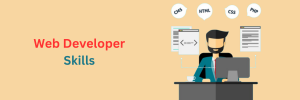In today’s digital world, web development has become a vital skill in high demand. As more and more businesses and organizations establish an online presence, the need for skilled web developers continues to grow. But what desired skills are required for an aspiring web developer? Let’s have a deep insight at the key skills that web developers need to have in their toolkit:

1. Programming Languages and Frameworks
At the core of web development is the ability to write clean, efficient code. Web developers need to be proficient in a variety of programming languages, such as HTML, CSS, JavaScript, PHP, Python, and Ruby. They should also be familiar with popular web development frameworks like React, Angular, Vue.js, Laravel, and Django, which can accelerate the development process and provide a structured approach.
2. Responsive Design
In the mobile-first era, it’s critical for web developers to have a strong understanding of responsive design. This means being able to create websites and web applications that adapt seamlessly across different devices and screen sizes, providing an optimal user experience no matter how someone is accessing the content.
3. Database Management
Many web applications require the ability to store, retrieve, and manipulate data. Web developers need to have database management skills, including knowledge of SQL (Structured Query Language) and experience working with relational databases like MySQL, PostgreSQL, or cloud-based options like Amazon RDS or Google Cloud SQL.
4. Version Control
Effective web developers leverage version control systems like Git to manage changes to their codebase. This allows them to collaborate with other team members, track code changes, revert to previous versions if needed, and streamline the development workflow.
5. Testing and Debugging
Web developers must be skilled in testing their code to identify and fix bugs or errors. This includes both manual testing and automated testing frameworks. They should also be adept at using browser developer tools and debuggers to diagnose and resolve issues in the front-end and back-end of an application.
6. User Experience (UX) Design
While web developers may not be the ones designing the user interface, they need to have a strong understanding of UX principles. This includes elements like intuitive navigation, accessibility, responsiveness, and overall visual appeal. The ability to translate UX designs into functional, high-quality code is crucial.
7. Security
As web applications handle sensitive user data and are exposed to potential cyber threats, web developers must prioritize security. This means implementing secure coding practices, understanding common vulnerabilities (e.g., cross-site scripting, SQL injection), and incorporating measures like encryption, input validation, and access controls.
8. Continuous Learning
The world of web development is subject to transform new technologies; frameworks shape up the web developer learning culture. Successful web developers demonstrate a willingness to continuously learn and adapt. They stay up-to-date with industry trends, experiment with new tools and techniques, and are eager to expand their skillset.
9. Collaboration and Communication
While web development is often a technical discipline, web developers must also possess strong communication and collaboration skills in order to convey strong message with another department. They need to be able to work effectively with designers, project managers, stakeholders, and other team members to understand requirements, provide updates, and deliver high-quality solutions.
10. Problem-Solving and Critical Thinking
At the heart of web development is the ability to solve problems. Web developers need to be adept at breaking down complex issues, analysing data, identifying root causes, and implementing creative solutions. Critical thinking skills, creativity, and a methodical approach are essential.
These are the key skills that web developers should strive to develop and refine. Of course, the specific skill set required may vary depending on the project, the organization, and the web developer’s role (e.g., front-end, back-end, full-stack). But mastering this core set of competencies will put web developers in a strong position to excel in their careers.
As the demand for web development continues to grow, individuals with these skills will be well-positioned to take advantage of the numerous opportunities in this dynamic and rewarding field. Whether you’re just starting your journey in web development or looking to enhance your existing skillset, focusing on these essential abilities will help you become a more valuable and much improved web development professional.





.png)


